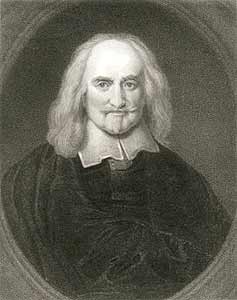Difference between revisions of "Thomas Hobbes"
| Line 1: | Line 1: | ||
| + | [[Image:Bhmvgjhfj.jpg|right|thumb]] | ||
'''Thomas Hobbes''' (1588-1679) was an English philosopher notable as one of the founders of [[social contract]] theory, and a forerunner of [[British empiricism]]. As a [[materialism|materialist]], his concept of human existence excluded the [[soul]], with the [[mind]] being given a purely mechanical explanation. He was widely rumoured during his lifetime to be an atheist. | '''Thomas Hobbes''' (1588-1679) was an English philosopher notable as one of the founders of [[social contract]] theory, and a forerunner of [[British empiricism]]. As a [[materialism|materialist]], his concept of human existence excluded the [[soul]], with the [[mind]] being given a purely mechanical explanation. He was widely rumoured during his lifetime to be an atheist. | ||
Revision as of 00:55, April 8, 2007
Thomas Hobbes (1588-1679) was an English philosopher notable as one of the founders of social contract theory, and a forerunner of British empiricism. As a materialist, his concept of human existence excluded the soul, with the mind being given a purely mechanical explanation. He was widely rumoured during his lifetime to be an atheist.
According to Hobbes's most famous work Leviathan (1651), life for humans prior to the foundation of the social contract was "solitary, poore, nasty, brutish and short". Humans had to form collectives in order to protect themselves from each other. This idea was extended by John Locke, who held (most notably in his Second Treatise on Government) that collectivisation was necessary for the promotion of economic growth. Hobbes's love of strong leadership led him to support monarchy, although he took the view that any strong government was better than nothing, and the stronger the better.
- Government should be like unto a man, strong and hard (Leviathan xvii).
